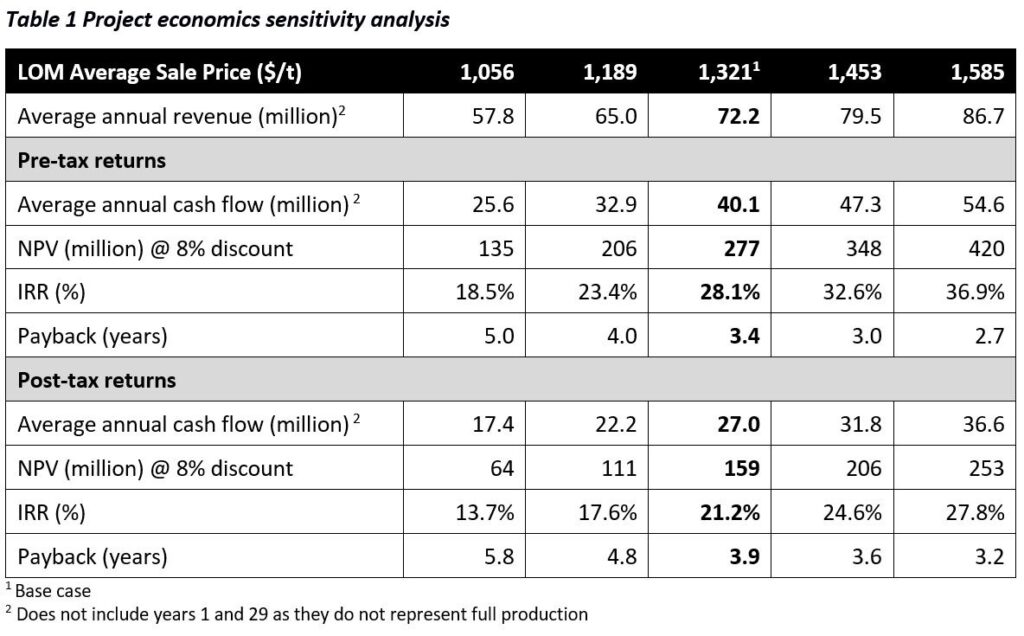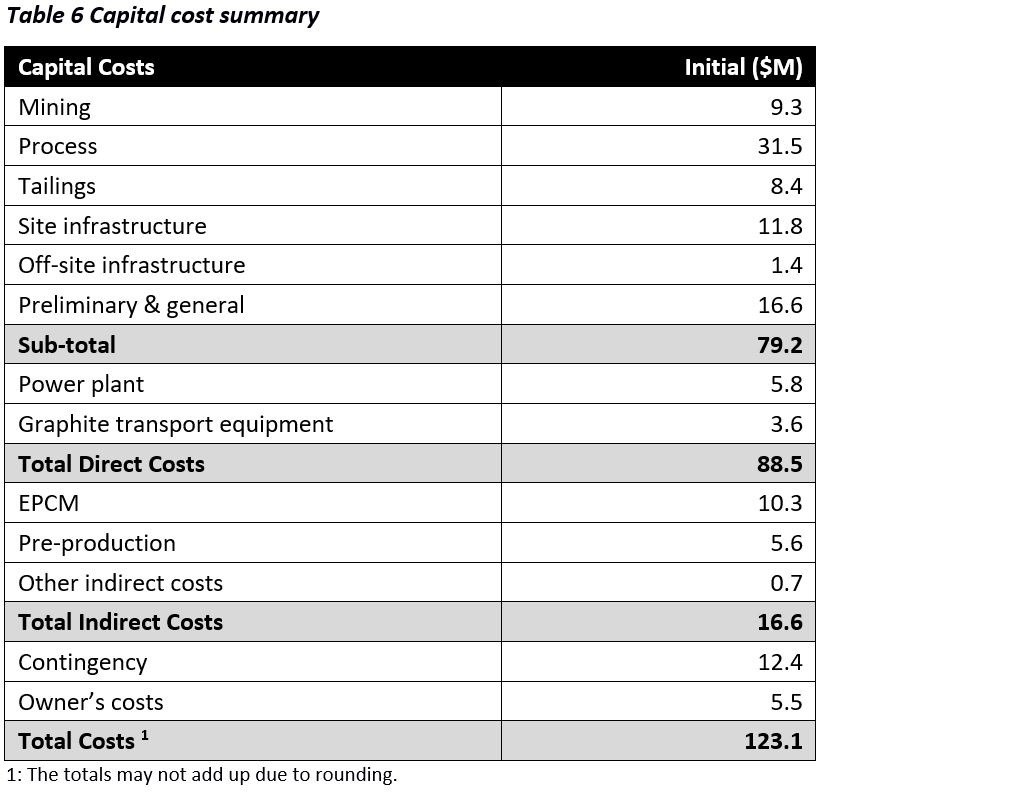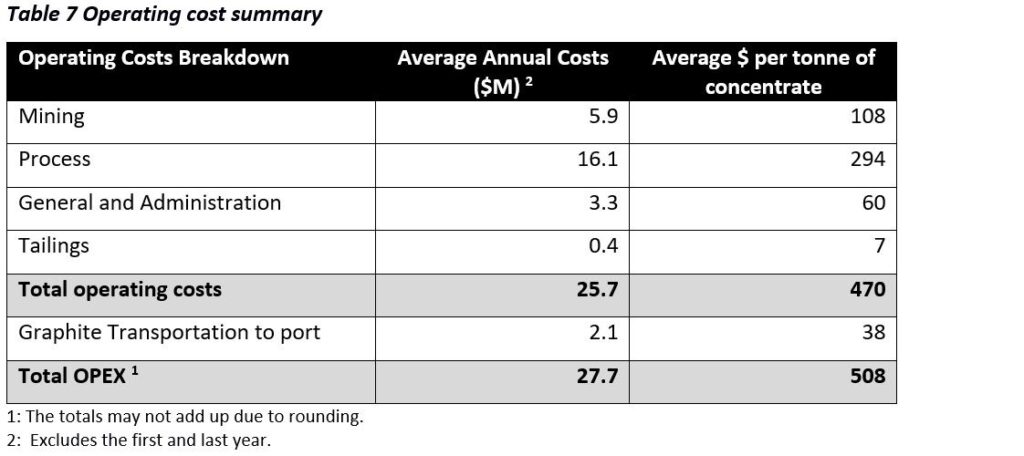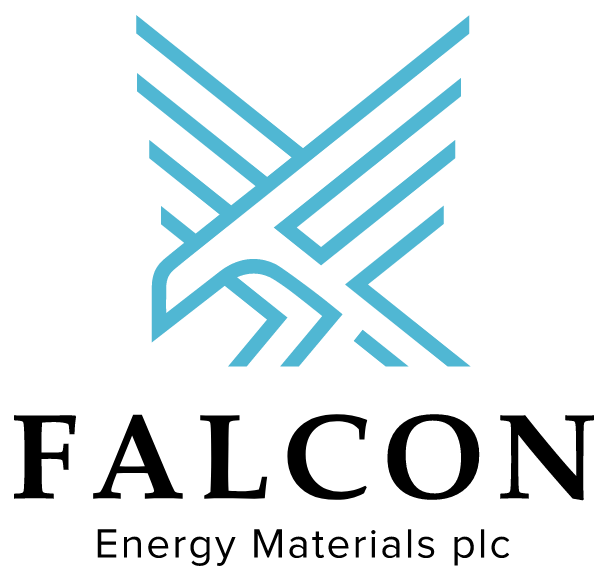Montreal, Quebec, July 4, 2019 – SRG Mining Inc. (TSXV: SRG) (“SRG” or the “Company”) is pleased to announce the results of its Feasibility Study (“FS”) for the development of the Lola graphite project in the Republic of Guinea, West Africa. The FS was prepared by Montreal-based DRA/Met-Chem, a division of DRA Americas Inc. (“DRA/Met-Chem”). All dollar figures are in United States dollars.
The FS was officially started in September 2018 and has been produced with the input of numerous engineering and consulting firms, notably DRA/Met-Chem, Epoch, BBA, Sahara Natural Resources, MDEng, SGS Canada, CCIC, and Jenike & Johanson. Included in the FS is an updated resource calculation, which follows the Company’s 2018 drilling campaign, bringing the total resource to 46.0 million tonnes (“Mt”) of measured and indicated resources grading 4.09% graphitic carbon (“Cg”).
The following lists the highlights of the Feasibility Study:
- Average annual production of 54,600 tonnes of graphite flakes over a 29-year mine life
- Proven & probable reserves of 42.0Mt @ 4.17% Cg
- Capital costs of $123 million (“M”) including a power plant of $5.8M, concentrate transport equipment of $3.6M, and contingency of $12M
- Added flexibility of the plant to process soft saprolite and fresh rock, provides optionality and the ability to expand the production profile
- Average operational costs of $470/tonne (“t”) and $38/t of transport. For the first 16 years of production, the average operational costs are $447/t.
- Pre-tax NPV(8%) of $277M and internal rate of return (“IRR”) of 28%
- Post-tax NPV(8%) of $159M and IRR of 21%
- Average grade of graphite flakes over 95%
- A low strip ratio of 0.69
This video is a flyby simulation of the project layout.
“These results are the culmination of many months of studies to de-risk the project and add to its robustness” said Ugo Landry-Tolszczuk, President and Chief Operating Officer of SRG. “The economic highlights present a highly profitable business using reasonable estimates for graphite selling price. Basic engineering will focus on improvements in the front-end of the plant, tailings management, and reducing the mining footprint.”
A technical report detailing the completed feasibility study in accordance with National Instrument (NI) 43 – 101 guidelines will be filed and available on SEDAR within 45 days from July 4, 2019. The effective date of the technical report is June 18, 2019.
Commercial Sales, Revenues & Project Economic Sensitivities
Over the life of the mine, the Lola project will produce an average of 54,600 tonnes of saleable graphite flakes per year. At an average sale price of $1,321/t, this represents $72.2M annual revenue incurring average operating costs of $508/t representing $27.7M annually. Given the volatility of graphite prices in recent years and the bilateral nature of sales contracts, a sensitivity analysis of the project’s economics is presented below in Table 1.

Mineral Resource Update
The resource estimate was established using data from boreholes drilled and sampled up to December 1, 2018. The total resource estimate of the Lola Project includes 6.84Mt grading 4.39% Cg, indicated resources of 39.2Mt grading 4.04% Cg, and inferred resources of 4.25Mt grading 3.75% Cg. The resource estimate has been prepared using a cut-off grade of 1.65% Cg, and has an optimized physical pit shell constrained at $1,400/t of concentrate. Figure 1 depicts the resource location which, represents approximately 40% of the deposit outline.
The mineral resources update was estimated as of June 18, 2019, in accordance with the definitions adopted by the Canadian Institute of Mining, Metallurgy and Petroleum and incorporated into National Instrument 43-101 – Standards of Disclosure for Mineral Projects (NI 43-101). The mineral resources estimate update for the Lola graphite project was carried out by Desmond Subramani (Pri. Sci. Nat – 400184/06), Independent QP and Principal Geologist – Mineral Resource Estimation at Caracle Creek International Consulting MINRES (Pty) Ltd. (CCIC MINRES).
Mining
The Lola deposit is characterised by its saprolite surface mineralization, which continues at depth into the fresh rock bed. For the FS, mining operations considered the mineralized material contained in the weathered zones (lateritic and saprolitic ore), as well as the mineralized material contained in the fresh-rock formation.
This results in a total Mineral Reserves estimate of approximately 42.0Mt grading 4.17% Cg, and an overall strip ratio of the operation (all the pits combined) of only 0.69. Figure 2 presents the overall site layout. The table below shows the proven and probable reserves.

The average grade fed to the processing plant over the 29-year mine life is 4.17% Cg, and the total material mined per year is 2.5Mt (ore and waste). Mining costs were established at $2.23/t material moved, considering pit design and access roads.

Process
The mineral processing plant consists of a crushing area and a concentrator where material beneficiation and concentrate dewatering, screening, and packaging takes place.
The process flowsheet includes crushing, scrubbing and grinding, rougher flotation, polishing, and cleaner flotation. The back end of the concentrator includes tailings and concentrate thickening, concentrate filtration and drying, dry screening and bagging of graphite products, and material handling.
All the tailings from the concentrator will be thickened and pumped to the tailings ponds. Reclaiming water from the tailings ponds has been considered in the process design to minimize fresh water makeup to the concentrator.
The graphite concentrate will be recovered by a conventional flotation process. Saprolite ore beneficiation process has an overall graphite recovery of 73.1%, producing a graphite concentrate grade of 95.4 % Cg. The addition of up to 45% of fresh rock in the feed blend improves the overall graphite recovery to 84.2%. A suitable process flowsheet able to handle saprolite as well as a feed blend with fresh rocks has been developed for the feasibility study.
Over the life of the mine, the plant will produce graphite concentrate divided into four (4) standard-size fractions: +48 mesh, -48+80 mesh, -80+100 mesh and -100 mesh presented in Table 5. Figure 3 depicts the simplified flowsheet.


Capital & Operating Costs
The capital costs for the project are presented below in Table 6. The capital costs shown include the Company’s assumed mining operations, graphite flake transport from-plant-to-port operations, and production of its own power using generators. All three of these items could be contracted to third parties. The average annual sustaining capital expenditure over a 29-year period is $4.4M.

The operating costs presented in Table 7 indicate the average operating costs, including graphite flake transport from mine-site to the port of Monrovia as well as port fees. These operating costs also assume the Company will mine and produce its own power using generators.
The average operating costs without transport for the first 16 years is $447/t, increasing thereafter.

Quality Control And Assurance
Qualified Persons (“QP”) have reviewed and verified that the technical information with respect to the FS contained in this press release is accurate, and have approved the written disclosure of such information. For readers to fully understand the information in this press release, they should read the Technical Report in its entirety when it is available on SEDAR, including all qualifications, assumptions, and exclusions that relate to the information to be set out in the Technical Report, which qualifies the technical information contained in the Technical Report. The Technical Report is intended to be read as a whole, and sections should not be read or relied upon out of context.
The QPs who will prepare the Technical Report are:
- DRA: Silvia Del Carpio, P.Eng., MBA (Project Manager and Financial Modelling), Yves Buro, P. Eng. (Geology), Patrick Perez, P.Eng. (Mineral Reserves and Mining), Volodymyr Liskovych, PhD, P.Eng. (Metallurgy), William Shadeed, P.Eng. (Processing)
- CCIC: Desmond Subramani, Pri. Sci. Nat. (Mineral Resources)
- MDEng: Kathy Kalenchuk, PhD, P.Eng. (Geotechnical Design)
- BBA: Luciano Piciacchia, PhD, P.Eng. (Water Management, Closure and Rehabilitation Plan)
- David Sims Inc.: David Sims, Geo, P. Geo (Hydrogeology)
- Epoch: Guy Wiid, Pr.Eng. C.Eng, George Papageorgiou, PhD, MSc, BSc Eng. (Tailings Design)
By virtue of education and relevant experience, the aforementioned are independent “Qualified Persons” for the purpose of NI 43 – 101. Other than as set forth above, all scientific and technical information contained in this press release has been reviewed, verified, and approved by Raphaël Beaudoin, P. Eng., Director of Operations and a Qualified Person for SRG under NI 43 – 101.
About DRA/Met-Chem
Met-Chem, a division of DRA Americas Inc., was originally established in 1969 as a consulting engineering company, headquartered in Montreal, and provides a wide range of technical and engineering services. DRA is a multidisciplinary global engineering group that delivers mining, mineral processing, energy, water treatment and infrastructure services from concept to commissioning and into operation. DRA has offices in Africa, Australia, Canada, China and the United States.
About SRG Mining
SRG Mining is a Canadian-based mining company focused on developing the Lola graphite deposit located in the Republic of Guinea, West Africa. SRG is committed to operating in a socially, environmentally, and ethically responsible manner.
For additional information, please visit SRG’s website at www.srgmining.com.
Or contact:
Ugo Landry-Tolszczuk Benoit La Salle, FCPA FCA
Email: [email protected] Email: [email protected]
Neither the TSXV nor its Regulation Services Provider (as that term is defined in the policies of the TSXV) accepts responsibility for the adequacy or accuracy of this release.
Forward-Looking Statements
This press release contains “forward-looking information” within the meaning of Canadian securities legislation. All information contained herein that is not clearly historical in nature may constitute forward-looking information. Generally, such forward-looking information can be identified by the use of forward-looking terminology such as “will”, “continue”, “provide”, “present”, “reasonable”, “established”, “has”, “demonstrate”, “potential”, or variations of such words and phrases or state that certain actions, events or results “may”, “could”, “would” or “might”. Forward-looking information is subject to known and unknown risks, uncertainties and other factors that may cause the actual results, level of activity, performance or achievements of the Company to be materially different from those expressed or implied by such forward-looking information, including but not limited to: (i) volatile stock price; (ii) the general global markets and economic conditions; (iii) the possibility of write-downs and impairments; (iv) the risk associated with exploration, development and operations of mineral deposits including the accuracy of the current mineral reserve and mineral resource estimates of the Company (including, but not limited to, ore tonnage and ore grade estimates) and mine plans for the Company’s mining operations (including, but not limited to, throughput and recoveries being affected by metallurgical characteristics); (v) the risk associated with establishing title to mineral properties and assets including permitting, development, operations and production from the Company’s operations being consistent with expectations and projections; (vi) fluctuations in commodity prices and other risks and factors described or referred to in the section entitled “Risk Factors” in the MD&A of the Company and which is available at www.sedar.com, all of which should be reviewed in conjunction with the information found in this news release
Forward-looking information is based on assumptions management believes to be reasonable at the time such statements are made, including but not limited to, the capacity to produce an average production of 54,600 tonnes of graphite flakes per year over a 29-year mine life, the Capital costs of being only $123 million, the capacity of the design to provide added flexibility of the plant to process soft saprolite and fresh rock, the capacity to provide optionality and the ability to expand production profile, the capacity of the average operational costs to be $470 per tonne and $38/t of transport, the Pre-tax NPV(8%) of being $277M and achieving internal rate of return (“IRR”) of 28%, and Post-tax NPV(8%) of $159M and IRR of 21% as well as the continued exploration activities and no material adverse change in mineral prices. Although the Company has attempted to identify important factors that could cause actual results to differ materially from those contained in the forward-looking information, there may be other factors that cause results not to be as anticipated, estimated or intended. There can be no assurance that such forward-looking information will prove to be accurate, as actual results and future events could differ materially from those anticipated in such forward-looking information. Such forward-looking information has been provided for the purpose of assisting investors in understanding the Company’s business, operations and exploration plans and may not be appropriate for other purposes. Accordingly, readers should not place undue reliance on forward-looking information. Forward-looking information is given as of the date of this press release, and the Company does not undertake to update such forward-looking information except in accordance with applicable securities laws.

